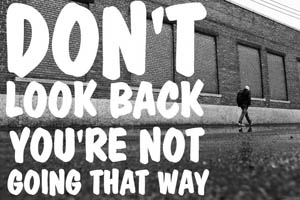Distraction-Proof® Advisor Ideas
Business-building ideas and advice to move you forward faster.
Don’t Let Your Past Define Your Future
 More than fourteen years of listening to inmates in Marin County Jail hadn’t prepared me for Jacob’s* story. As a jail chaplain I heard how the abuse began when Jacob was four years old and lasted until he ran away from home three years later. What happened to him was cruel, tragic, and evil. Yet, amazingly, Jacob did not feel one trace of anger toward his parents. On the contrary — Jacob actually felt sorry for them. Although he was forced to live on the streets and fend for himself by the age of seven, he felt only sadness for his parents’ state of mind. Otherwise, he was looking forward to life.
More than fourteen years of listening to inmates in Marin County Jail hadn’t prepared me for Jacob’s* story. As a jail chaplain I heard how the abuse began when Jacob was four years old and lasted until he ran away from home three years later. What happened to him was cruel, tragic, and evil. Yet, amazingly, Jacob did not feel one trace of anger toward his parents. On the contrary — Jacob actually felt sorry for them. Although he was forced to live on the streets and fend for himself by the age of seven, he felt only sadness for his parents’ state of mind. Otherwise, he was looking forward to life.
In fact, he told me the biggest challenges since he had been in jail were from doctors and psychologists who kept telling him that he should be bitter, angry, and vengeful. Jacob responded saying that he couldn’t change the past and was more interested in moving forward and getting on with life.
* Jacob’s name has been changed.
***
Last week I attended the memorial service of a good friend. Richard was an Englishman, a year younger than me. With our shared Commonwealth background, faith, and immigrant status, we connected at many levels, and I always enjoyed our time together. His death was unexpected, and his memorial served as a wake-up call to many. Richard lived life to the fullest, impacting all around him to pursue excellence and inspiring them to keep persevering, regardless of life’s challenges and even if plans didn’t work out as expected.
***
Certainly there are times when we need to evaluate and process past experiences both for what we can learn and for our mental and emotional well-being. However, too often people dwell on memories of the past, letting what did happen shape their expectations of what can happen.
Jacob and Richard shared very different backgrounds, yet neither of them let regrets or setbacks define them. They both were focused on moving forward in life, one step at a time.
Our industry’s ubiquitous warning phrase, “Past performance is not indicative of future results,” applies to more than just investment-return discussions; it’s relevant to life. Just because something unplanned and negative happens to us, that does not mean we have to permit it to frame our thinking and emotions going forward.
Many people today obsess about things over which they have no control. At least $42 billion is spent annually in the U.S. treating anxiety disorders, with $22.8 billion of that going to addressing physical illness caused by mental stresses and worries.
As financial counselors, we often hear about regrets, remorse, and reasons why things didn’t go as planned and see the fear and even paralysis that can bring. You can help your clients learn from their bad experiences, but not let those events define them and their appetite and enthusiasm for life.
When clients share their regrets and fears:
- Hear what they’re really saying. Picture their situation. Imagine what they may have felt like during that experience. Listen for words that hint that the real issue may be something deeper you want to ask questions to uncover.
- Isolate the issue. Ask questions to guide your client to realistically assess what happened, consider the reasons why, and decide what they can learn from this to better proceed forward.
- Move instead of mope. Wallowing in what happened and pining for what might have been is a waste of time because it is fruitless. Instead, help clients refocus on the next step they can take to realize their dream, and then encourage them to take it.
Like Jacob and Richard, don’t let past disappointments limit your future. Focus on moving forward, one step at a time.
Paul Kingsman
Paul Kingsman is a sought-after expert on how to be distraction-proof. Through his speaking, writing, and coaching, he teaches financial services professionals how to maintain focus and take practical daily steps to successfully grow their businesses and achieve outstanding long-term results. To find out more about Paul and how he can equip you or your team to achieve your own outstanding results, visit PaulKingsman.com.
Search
Recent Posts
- When Referrals Aren’t a Good Fit (Distraction-Proof Advisor Idea Video #350)
- Make the Most of Reconnecting (Distraction-Proof Advisor Idea Video #349)
- Two More Communication Crutches To Avoid (Distraction-Proof Advisor Idea Video #348)
- Olympic Lesson: How to Make Big Goals Reality (Distraction-Proof Advisor Idea Video #347)
- Olympic Lesson: Make Time To Give Back (Distraction-Proof Advisor Idea Video #346)
Archives
Client Testimonials
"2021 has been a great year for my business, and a lot of that was because of what I learned from you, Paul. You've been an advisor, so you get it! Thank you so much for your invaluable transformative coaching and advice!"
Michelle Glass, Glass Financial Advisors
